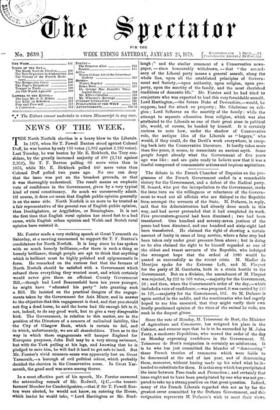Mr. Forster made a very striking speech at Great Yarmouth
on Saturday, at a meeting summoned to support Sir T. F. Buxton's candidature for North Norfolk. It is long since he has spoken with so much homely brilliance,—for there is such a thing as homely brilliance, though people are apt to think that anything which is brilliant must be highly polished and epigrammatic in form. He remarked on the curious fact that the farmers of North Norfolk should be satisfied with a Government which refused them everything they wanted most, and which certainly would never give them an efficient County Government Bill,—though had Lord Beaconsfield been ten years younger, he might have "educated his party" into granting such
BilL He insisted on the practical dangers of the engage- ments taken by the Government for Asia Minor, and in answer to the objection that this engagement is dead, and that you should not flog a dead horse, he said the horse had life enough left in it, not, indeed, to do any good work, but to give a very disagreable kick. The Government, in relation to this matter, are in the position of the Directors of a concern of unlimited liability, like the City of Glasgow Bank, which is certain to fail, and in which, unfortunately, we are all shareholders. Then as to the way in which these engagements will hamper England for European purposes, John Bull may be a very strong swimmer, but with the Turk pulling at his legs, and knowing that he is pledged to save him, he will find it hard to get safe to land. But Mr. Forster's vivid common-sense was apparently lost on Great Yarmouth,—a borough of evil political odour, which probably decided the election in the Conservative sense. In Great Yar- mouth, the good seed was sown among thorns.


































